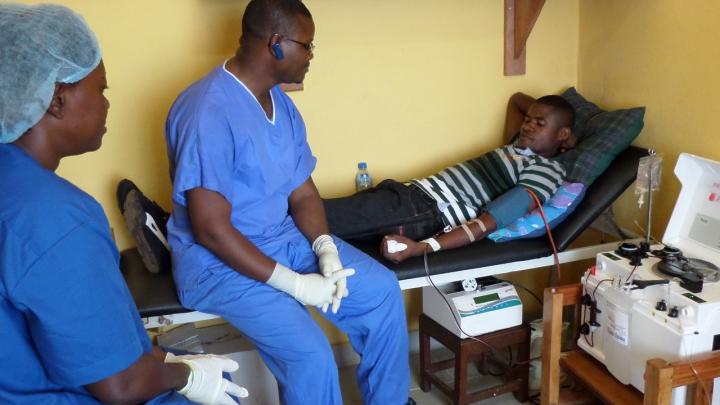
Credit: Professor Calum Semple
A high proportion of survivors of Ebola experienced a resurgence in antibody levels nearly a year after recovery, a new University of Liverpool study has found.
Published today in Nature, the finding hints that hidden reservoirs of virus could exist long after symptoms ease and has implications for monitoring programmes and vaccine strategies.
When a person is infected with Ebola virus, their body produces antibodies to fight the disease. Antibody concentrations peak and then decline slowly over time, providing the body with some degree of immune protection over the infection. However, little is known about the antibody response over prolonged time periods.
Researchers from the University’s Institute of Infection, Veterinary and Ecological Sciences tracked antibodies in a cohort of survivors of Ebola virus disease from the 2014-2016 Sierra Leone outbreak for up to 500 days after recovery from their infection. As expected, antibody levels dropped away slowly after the acute phase of recovery, but then unexpectedly increased rapidly once more around 200 days later, only to decline thereafter. This particular pattern was observed in over half of participants with longitudinal data.
Although there was no detectable Ebola virus in the participants’ plasma taken around the time of asymptomatic antibody resurgence, the study indicates that the Ebola virus may be able to persist inside the bodies of many recovered patients for long periods of time. ‘Hiding’ inside immunologically privileged sites, such as the eyes, central nervous system or testes, the virus may then start to replicate spontaneously, prompting the renewed antibody response.
With this in mind, the researchers suggest that long-term monitoring of survivors is warranted, and that repeat immunisation with vaccines should be considered to boost and maintain protective antibody responses in survivors.
The work was led by Dr Georgios Pollakis, Professor Bill Paxton and Professor Calum Semple at the University of Liverpool and Dr Janet Scott, now at the MRC-University of Glasgow Centre for Virus Research.
Research collaborators included experts from Public Health England, the National Safe Blood Service and the 34-Military Hospital, in Freetown, Sierra Leone.
Corresponding author and study lead Dr Georgios Pollakis, Senior Lecturer at the University of Liverpool, said: “Our finding that many survivors experienced a resurgence in antibodies, which could not be explained by re-infection or vaccination, was surprising and demonstrates a need for continued monitoring of these patients.”
Lead Investigator Professor William Paxton, Professor of Virology at the University of Liverpool, added: “Viruses throw up many surprises, but this high frequency of antibody re-stimulation was not something we expected to find, and indicates that vaccination of Ebola survivors should be considered to keep immunity high and suppress further viral activity. Furthermore, the findings will also help us to better understand the immune system.”
Trial Clinical Lead Dr Janet Scott, Clinical Lecturer in Infectious Diseases at the MRC-University of Glasgow Centre for Virus Research, said: “Evidence of Ebola virus antigen driving an immune response hundreds of days after apparent recovery from Ebola virus disease offers a mechanism that could be driving Post Ebola Syndrome. The clinical science community should now increase efforts to better understand, treat and support Ebola survivors.”
Chief Investigator Professor Calum Semple, Professor of Outbreak Medicine at the University of Liverpool commented: “This phenomenon is likely to have occurred in all populations of people who have survived Ebola virus infection in past years. Our description of this biological phenomenon should not be taken to indicate yet more problems for Ebola disease survivors, rather a better understanding of their problems. It is very important to emphasise that no Ebola virus transmission events were observed in this cohort.”
The Liverpool team is now using a similar research approach to track antibodies in COVID-19 survivors.
###
The study was supported by the University of Liverpool, Wellcome Trust, Bill and Melinda Gates Foundation, Public Health England, and the NHS Blood and Transplant.
Media Contact
Nicola Frost
[email protected]
Related Journal Article
http://dx.




